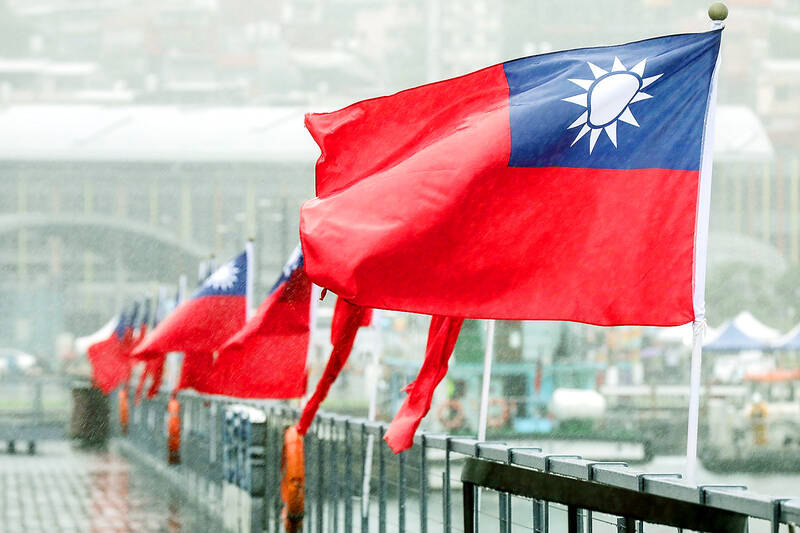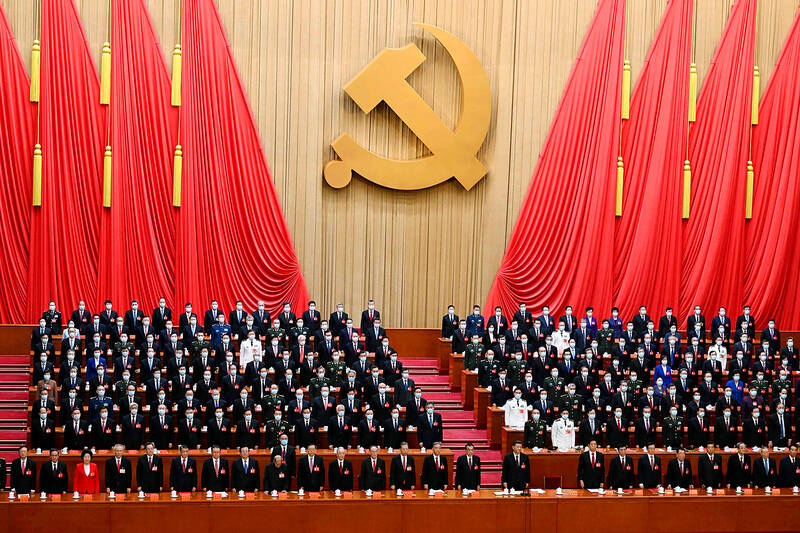Taiwan’s Mainland Affairs Council urged the new Chinese Communist Party (CCP) Central Committee to renounce confrontational attitudes toward Taiwan and instead look to peaceful methods of resolving differences across the Taiwan Strait.
The CCP’s 20th National Congress, which concluded yesterday, included a clause saying that the CCP is “adamantly against Taiwan’s independence and will do anything in its power to curb the pro-Taiwan independence movement,” which the congress unanimously approved.
The congress officially added a CCP charter requirement for political loyalty in the military, and resolved that the state would create a robust and world-class military through reforms, modernization and fostering talent.

Photo: Bloomberg
The congress also said it would encourage a “fighting spirit” in the military with “Chinese-style modernization.”
The CCP also wrote into its charter that it would gradually achieve “common prosperity,” developing a “broader, fuller and more robust people’s democracy.”
Yesterday’s charter revisions incorporate priorities and policy directions that Chinese President Xi Jinping (習近平) had previously outlined, including the “Two Safeguards” — which assures Xi’s central status within the party and the party’s centralized authority over China — and the “Two Establishments,” which confirm that “Xi Jinping thought” is the guiding principle of China’s future development.

Photo: AFP
The Mainland Affairs Council responded that the government’s cross-strait policies would maintain the “four resolutions” and the “four resiliences,” as outlined by President Tsai Ing-wen (蔡英文) during her Double Ten National Day address.
The “four resolutions” refer to supporting a free and democratic government; agreeing that Taiwan and the People’s Republic of China do not belong to each other; defending Taiwan’s sovereignty; and observing that the future of Taiwan must follow the will of its people.
The “four resiliences” refer to making Taiwan’s financial, social security, democratic government and national defense industry resilient against unfavorable circumstances.
The Chinese Nationalist Party (KMT) told the Chinese-language China Times that the party would not support Taiwanese independence, nor would it support the “one country, two systems” concept.
The KMT said it stands with the majority opinion of Taiwanese and would uphold its three primary missions — to protect the Republic of China, to guard freedom and democracy, and to maintain regional peace across the Taiwan Strait and the region in general.
Additional reporting by Reuters

Taiwan is projected to lose a working-age population of about 6.67 million people in two waves of retirement in the coming years, as the nation confronts accelerating demographic decline and a shortage of younger workers to take their place, the Ministry of the Interior said. Taiwan experienced its largest baby boom between 1958 and 1966, when the population grew by 3.78 million, followed by a second surge of 2.89 million between 1976 and 1982, ministry data showed. In 2023, the first of those baby boom generations — those born in the late 1950s and early 1960s — began to enter retirement, triggering

ECONOMIC BOOST: Should the more than 23 million people eligible for the NT$10,000 handouts spend them the same way as in 2023, GDP could rise 0.5 percent, an official said Universal cash handouts of NT$10,000 (US$330) are to be disbursed late next month at the earliest — including to permanent residents and foreign residents married to Taiwanese — pending legislative approval, the Ministry of Finance said yesterday. The Executive Yuan yesterday approved the Special Act for Strengthening Economic, Social and National Security Resilience in Response to International Circumstances (因應國際情勢強化經濟社會及民生國安韌性特別條例). The NT$550 billion special budget includes NT$236 billion for the cash handouts, plus an additional NT$20 billion set aside as reserve funds, expected to be used to support industries. Handouts might begin one month after the bill is promulgated and would be completed within

NO CHANGE: The TRA makes clear that the US does not consider the status of Taiwan to have been determined by WWII-era documents, a former AIT deputy director said The American Institute in Taiwan’s (AIT) comments that World War-II era documents do not determine Taiwan’s political status accurately conveyed the US’ stance, the US Department of State said. An AIT spokesperson on Saturday said that a Chinese official mischaracterized World War II-era documents as stating that Taiwan was ceded to the China. The remarks from the US’ de facto embassy in Taiwan drew criticism from the Ma Ying-jeou Foundation, whose director said the comments put Taiwan in danger. The Chinese-language United Daily News yesterday reported that a US State Department spokesperson confirmed the AIT’s position. They added that the US would continue to

The National Development Council (NDC) yesterday unveiled details of new regulations that ease restrictions on foreigners working or living in Taiwan, as part of a bid to attract skilled workers from abroad. The regulations, which could go into effect in the first quarter of next year, stem from amendments to the Act for the Recruitment and Employment of Foreign Professionals (外國專業人才延攬及僱用法) passed by lawmakers on Aug. 29. Students categorized as “overseas compatriots” would be allowed to stay and work in Taiwan in the two years after their graduation without obtaining additional permits, doing away with the evaluation process that is currently required,